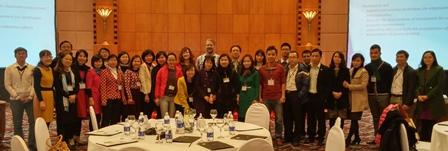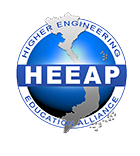In December of 2014 a series of workshops were presented to HEEAP and non-HEEAP faculty in HCMC, Danang and Hanoi. The workshops consisted of four different sessions, two lead by David Benson and two by Kathy Wigal for a total of two days. David Benson created two sessions to support HEEAP efforts.
The first session: “Introduction to Active Learning”, was an experiential workshop examining the goals of active learning and contrasting the methods used in active learning classes with passive or “traditional” lecture methods. Faculty learned about the reasons for introducing active learning methods into their classes and how Bloom’s Taxonomy can be used to evaluate the level cognition involved in their instructional methods. A key part of this workshop involved exploring the wide range of active learning methods that can be used to engage students and promote high-level thinking: activities ranging from quick and inexpensive activities (low-overhead activities), such as think-pair-share and minute papers, to activities which require considerable preparation and some expense, such as integrated design problems, desktop projects, and problem-based learning activities. The “Introduction to Active Learning” workshop concluded with an example of a low-cost, desktop project activity. In this activity, faculty experienced being challenged while they worked as a team to reverse engineer the construction of a cam-follower toy and then designed a cam-follower system out of cardstock paper which performed to a given criteria.

Workshop participants in Danang
The second session led by Benson: “Creating Active-Learning Exercises by Adapting Resources Found” on the Internet focused on how faculty members can evaluate instructional materials found online and then take steps to customize and re-design the materials to achieve their own classroom objectives. This session walked faculty members through a variety of online educational resources.
These sessions concluded with a unit on incorporating the Arduino microcontroller system into classes. Faculty members explored the Arduino system, its basic elements and the interplay between inputs and outputs that can be achieved using this system. Faculty members also explored several of the built-in tutorial activities to identify educational gaps in the tutorials and to practice proposing alternative methods for instruction.
In discussions with Benson during the workshop, many faculty indicated that they were surprised and encouraged that some of these methods and techniques could be directly inserted into their existing classes with very little difficulty or expense. Many faculty were also deeply impressed by the simplicity of the desktop project (and how their skills and thinking were stretched by something so simple) and also by the potential inherent in the Arduino systems.
In addition, Kathy Wigal led two sessions, the first session titled: “Building Consensus – Effective Team Decisions for a Common Purpose.” The objective of this session was to provide faculty with an opportunity to explore and evaluate a variety of techniques for effective team decision making, practice strategies for conflict resolution, implementation and follow-up strategies. The second session led by Wigal titled, “Classroom Assessment and Evaluation: Supporting ABET and AUN-QA Accreditation Efforts,” allowed faculty to explore and practice techniques for classroom assessment and evaluation with a focus on the dual purpose of assessment for continuous program improvement critical to supporting ABET and AUN-QA accreditation efforts as well as course grading.
Visit our Flickr page to see more pictures.
Photo caption: Workshop participants in Danang

